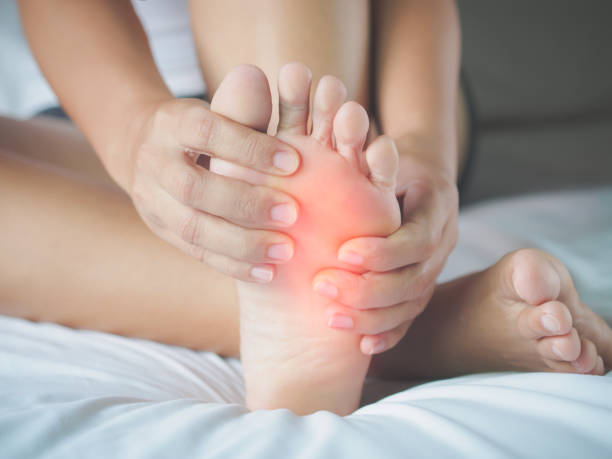Our feet are prone to various bacterial infections due to factors such as sweat, moisture, and close contact with surfaces harboring bacteria. If you want to ensure healthy feet and prevent them from infections, then read the below-mentioned tips:
-
Keep Your Feet Clean and Dry
Maintaining proper hygiene is crucial to prevent bacterial infections. You should regularly wash your feet with mild soap and warm water. Also, you should thoroughly clean the space between your toes and get rid of dirt or dead skin. After washing, pat your feet dry, paying special attention to the areas between the toes, as moisture can promote bacterial growth.
-
Never Wear Wet Shoes
Wearing wet shoes can have detrimental effects on your foot health. Wet shoes create a moist environment that promotes the growth of bacteria and fungi, leading to infections such as athlete’s foot. Additionally, prolonged exposure to moisture can weaken the structural integrity of the shoes, causing them to deteriorate more quickly. Wet shoes can also lead to blisters, discomfort, and unpleasant odors.
Moisture can soften and make it highly susceptible to friction and irritation. It is crucial to avoid wearing wet shoes to maintain proper foot hygiene, prevent infections, and ensure the longevity of your footwear. Sometimes, we do not have time to air-dry our shoes. In these kinds of situations, you should consider using a portable boot dryer for quickly drying your boots.
-
Wear Breathable Shoes and Socks
Bacteria thrive in warm, moist environments. Choose breathable footwear made of natural materials like leather or canvas to promote airflow and lessen excessive sweating. Avoid wearing shoes that are too small or made of synthetic materials since they can trap moisture and foster the growth of bacteria. Additionally, select moisture-wicking socks to assist keep your feet dry by removing moisture from the skin.
-
Rotate Your Shoes
Give your shoes time to dry out between uses. You should change your shoes and give time to fully air out them. It will help in reducing moisture accumulation and stop the growth of bacteria. If your shoes become damp or wet, let them dry thoroughly before wearing them again.
-
Use Antifungal Powders or Sprays
Antifungal powders or sprays can help control moisture and inhibit the growth of bacteria and fungi. Apply these products to your feet and inside your shoes to keep them dry and free from bacterial infections. Look for products containing ingredients like miconazole or clotrimazole, which are effective against many types of fungi and bacteria.
-
Avoid Walking Barefoot in Public Areas
You should walk barefoot in public areas like pools, communal showers, locker rooms, etc. which can expose your feet to various kinds of infections. Always wear flip-flops, sandals, or water shoes to protect your feet from direct contact with these surfaces and reduce the risk of bacterial infections.
-
Trim Your Nails Properly
It is important to do proper nail care to prevent bacterial infections. Trim your toenails regularly, cutting them straight across and avoiding excessively short cuts or rounding the corners, as these can lead to ingrown nails and potential infections. Clean under your nails using a gentle brush to remove dirt and bacteria.
-
Avoid Sharing Personal Items
Sharing towels, socks, shoes, or any other personal items can transfer bacteria and increase the risk of infections. Use your own personal items and discourage sharing with others to maintain good foot hygiene. Sharing towels, socks, shoes, or any other personal items with others can significantly increase the risk of bacterial and fungal infections.
These items can harbor bacteria, fungi, and other microorganisms that can easily be transferred from one person to another. When you wear wet shoes, not only are you exposing your own feet to potential infections, but also degrading the quality of your shoes. You should consider investing in a 12 volt boot dryer to quickly dry your boots.
-
Change Your Socks Regularly
Wearing clean socks is vital for maintaining foot hygiene. Moisture-wicking socks are particularly beneficial in keeping your feet dry and minimizing bacterial growth.
-
Treat Foot Injuries Promptly
Even minor cuts, blisters, or abrasions on your feet can provide an entry point for bacteria. Clean and treat any foot injuries promptly by washing the area with mild soap and warm water, applying an antiseptic ointment, and covering the wound with a sterile bandage.
-
Seek Medical Attention When Necessary
If you notice any signs of a bacterial infection, such as redness, swelling, pain, pus, or persistent itching, it’s important to seek medical attention. A healthcare professional can provide a proper diagnosis and prescribe appropriate treatment, such as topical or oral antibiotics, to resolve the infection.
Wrap Up
By following these preventive measures, you can significantly reduce the risk of bacterial infections and maintain healthy feet. Remember, good foot hygiene and proper care are essential for overall foot health and well-being.





